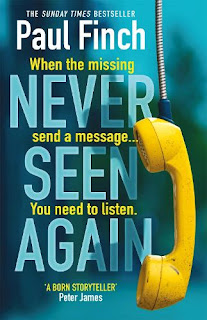Surprise is often the response when I mention that my new novel, NEVER SEEN AGAIN, is about an investigative journalist rather than a police officer. That’s because I’m probably best known as an ex-cop. But not many are aware that when my cop days had ended I became a journalist, plying my trade on newspapers across Northwest England.
“You moved from gamekeeper to poacher,” is a viewpoint I often hear.
It’s an oft-used term, of course, but it’s also an oversimplification.
It’s easy to think of the average cop as a law-enforcement robot who does the right thing because he or she is duty-bound, while the average journalist is a freebooter working both sides of the fence, driven by a moral compass that isn’t always consistent with everyone else’s.
I wouldn’t deny that in recent times we’ve seen some glaringly unprofessional journalism. We’re a politically divided nation, and many of our media outlets reflect this. But I’d contend that the basic journalistic instinct remains: report the news, present factual analysis, and if you must insist on taking sides, at least give the other side a right of reply.
Ultimately, certainly in Britain, I’d argue that most investigative journalists, like most cops, seek an orderly and happy society, and set out to be the bane of the bad guys.
But there the similarities end.
To start with, and perhaps most obviously, journalists have no back-up. They possess no power of arrest, they can’t draw firearms, they don’t wield the might of Government. So, if they’re on the trail of belligerent people, it might turn risky.
From Elijah Parish Lovejoy back in 1837, to more recent heroes like Fritz Gerlich and Anna Politkovskaya, journalists have died on the job; Lovejoy at the hands of a pro-slavery mob who objected to his newspaper’s abolitionist stance, Gerlich on the Night of the Long Knives for exposing the realities of Nazi violence, Politkovskaya in 2006 when a contract killer cornered her in a Moscow lift after a career spent uncovering the wrongdoings of Putin’s government.
But perhaps the most palpable contrast between cop and journo is that, while both may seek to drive the cause of right, the cop works for the public sector, the journalist for the private. Even the most crusader-like reporting will have no impact if nobody reads it. And today, that news market is more crowded than ever, so the temptation to be sensational increases, the drive is on to get ever better stories, ever bigger headlines.
And this is the point at which people may decide they have a problem with journalism. At what stage does it become too scavenger-like? How can you respect a profession, which, though it produced such world-changing scoops as Woodward and Bernstein’s Watergate exposure can also show such shocking lapses of judgement as the News International phone-hacking scandal?
Don’t get me wrong. Cops face dilemmas too. In many of my police novels, my heroes and heroines stray into and beyond ethical grey areas, but in those cases you could argue they are trying to remove some heinous and destructive elment from society.
As a journalist, it’s harder to put such a positive spin on your indiscretions. Especially when, as the man in the street might say, “you’re trying to sell newspapers, mate”.
And this was the personal drama I sought to create at the heart of NEVER SEEN AGAIN. Where does it leave you when, in your efforts to expose villainy, but also to bump your sales and make yourself a star, the wheels come off so badly that it costs lives?
Where do you go when you’re used to being adored but now find yourself deservedly reviled? When the one thing you’re really good at is closed to you because no one will pay you to do it anymore?
It’s not too much of a spoiler to reveal that, in NEVER SEEN AGAIN, disgraced journo, David Kelman, gets a glimpse of redemption (though it’ll be the hardest road he’s ever taken). But it was his inner pain that I became most fascinated by.
How did I end up with such tunnel vision?
How did I not see the damage I was doing?
How did I become one of those callous monsters that I so enjoyed exposing?
I love a rollicking good thriller full of blood and thunder. But the human story is often equally (if not more) interesting. Whether I’ve managed to balance the two in NEVER SEEN AGAIN, only my readers can judge.
Never Seen Again by Paul Finch is published by Orion on 17 March in paperback, £7.99
A message no one was supposed to hear. Jodie Martindale's disappearance remains a mystery, unsolved to this day. A message that will change everything. David Kelman covered the story. But he made a huge mistake, which cost someone their life. A message from the missing. Now, he has evidence he shouldn't have. It's a message from Jodie - who has been missing for six years - but sent just two weeks ago...
More information about Paul Finch can be found on his website. You can also find him on Facebook and follow him on Twitter @paulfinchauthor



No comments:
Post a Comment